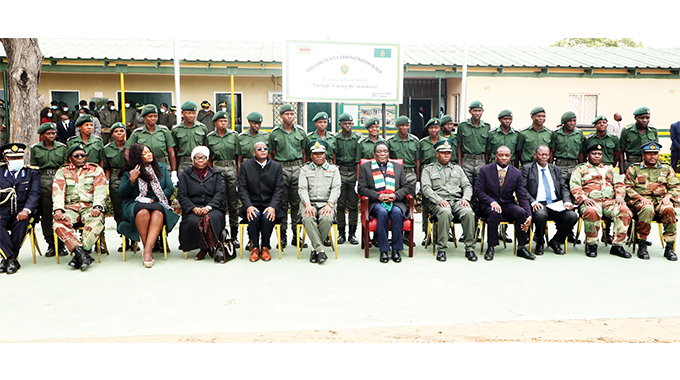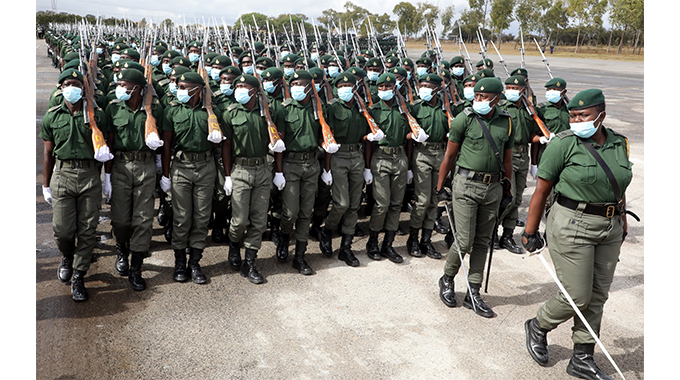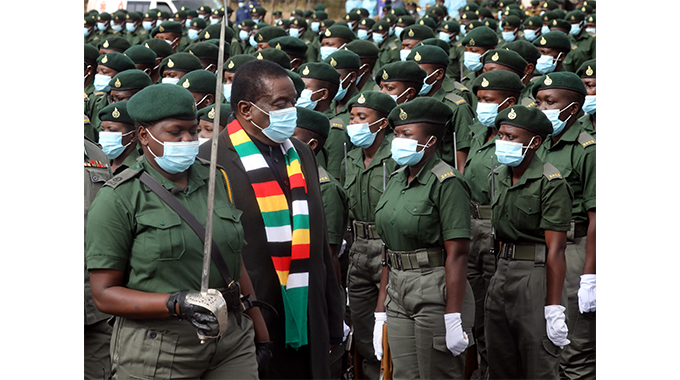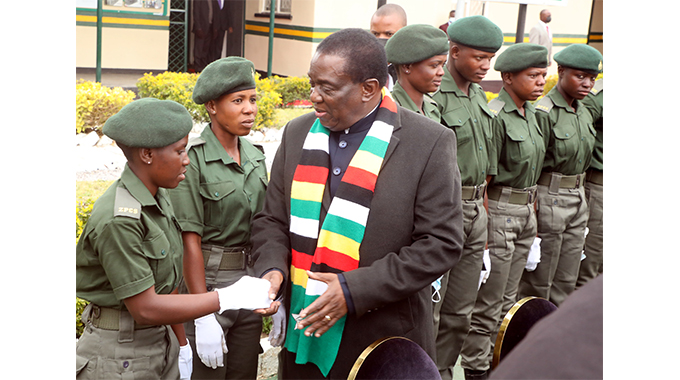WATCH: San community writes own piece of history

Mashudu Netsianda, Senior Reporter
THE Second Republic is championing equal participation of all Zimbabweans in national development, including previously marginalised communities, under its broad-based empowerment programmes.
In line with the Government’s philosophy that no one and no place should be left behind in national development, President Mnangagwa’s administration has facilitated the recruitment of members of the San community into the country’s security services.
This buttresses a recent Cabinet resolution that the country’s security services should set up a quota system for the San community as part of their integration into the broader society.
Yesterday, a total of 20 youths, comprising eleven males and nine females from the San community in Tsholotsho District, Matabeleland North Province, wrote their own piece of history when they became the first group to graduate as the Zimbabwe Prisons and Correctional Services (ZPCS) officers during the 150th recruit correctional officers’ pass-out parade at Ntabazinduna Prison Training School.

A total of 771 officers comprising 560 males and 211 females, graduated after six months of training.
In his remarks, President Mnangagwa, who was the guest of honour at the event, said the recruitment of members of the San community into ZPCS dovetails with the Second Republic’s thrust of creating opportunities for everyone through equal participation in Government empowerment and development programmes.
“In the spirit of leaving no one and no place behind, it is impressive that some of the graduates of this pass-out parade were drawn from the San community,” he said. “This dovetails with my administration’s thrust to ensure equal participation by all citizens in the Government’s various broad-based empowerment and development programmes.”
The San community is found on the outskirts of Bulilima District, Matabeleland South and Tsholotsho District in Matabeleland North.

President Mnangagwa
Prior to the Second Republic’s interventions, the San people lived in their own world, far removed from the rest of the country. Most of them did not have birth certificates or identity documents resulting in them lacking access to many services, including health and voting.
A majority of them could not access school and as a result could not secure formal jobs, but only menial ones.
Last year, President Mnangagwa sent a team of ministers to meet the San people to hear their concerns and how they wanted them to be resolved.
Shortly after that, officials were deployed to Tsholotsho to issue birth certificates and other identity documents. More than 5 000 people benefitted.
Government is also working on funding the building of a primary and secondary school to enhance access to education within the San community.
Turning to women empowerment, President Mnangagwa said the inclusion of a significant number of women in the ZPCS recruitment, training and staff development programmes demonstrates Government’s commitment to recognise and promote gender equality in line with the National Gender Policy, the African Union (AU) Agenda 2063 and UN Sustainable Development Goals.
He also commended the various stakeholders and experts who contributed towards the delivery of a comprehensive training course during which no drop-outs notwithstanding the demands and high expectations of the programme,
Through a well-coordinated multiple stakeholder approach, President Mnangagwa said, the recruit correctional training course class received lectures on constitutionalism, human rights, gender, drugs and substance abuse, among other modules.
“These equipped the cadets with contemporary skills on dealing with emerging complex issues and broader global realities, characterised by the rise in the use of ICTs and associated cyber security threats and acts of terrorism, among others,” he said.
The President said the mutually beneficial and cooperative approach bolsters the effectiveness of the country’s correctional services in bridging the gap between the offender, society and the quest to attain sustainable development.
“This is more important as the Zimbabwe Prisons and Correctional Service is driven by the dictum ‘for the incarceration and rehabilitation of offenders and their successful re-integration into the society’,” said President Mnangagwa.

“This is more so as offenders come from the society, commit crimes against those in the society and ultimately through your work, they will go back to the same communities.
“It is, therefore, my expectation that as competent and professional correctional officers, you are now ready to execute your mandate as enshrined in Part 5, Section 227 of our national Constitution.”
The President urged the graduates to advance the ZPCS vision, saying it should remain their guiding force as they serve the country.
“This must include ensuring that the correctional services lead to the successful reintegration of inmates into society, as well as inculcating a developmental, productive and forward-thinking mindsets among the inmates.
“Under your care, inmates must thus develop growth and innovative mindsets for them to neatly fit in the fast-changing social, business and economic environment,” he said.

Meanwhile, the Government’s decision to set up a quota system for the San community in the country’s security services has ignited excitement and optimism among the San people. Those who spoke to Chronicle could not hide their joy as they shared their tales of hope.
“We have been living an unbearable life of eking out a living through cheap labour. You will notice that upon reaching the age of 14 years, most of us would be exploited and used as cheap labour by working in the fields,” said Mr Senzosenkosi Ncube.
“Girls are impregnated at a tender age by members from surrounding communities and refuse to take responsibility.”
Ms Everjoy Ngwenya (20) who hails from Jalume Village in Tsholotsho said: “I finished my O-level studies in 2018 and passed six subjects, but since then I have been stuck at home doing nothing. When this opportunity arose, I grabbed it with both hands.”
Ms Ngwenya hailed the Government for introducing the quota system for the San community, saying it will help economically uplift their lives.

“Now that I have graduated as a correctional officer, I am looking forward to supporting my parents and through such programmes, we will be empowered as a San Community given that for a long time, we have been marginalised,” she said.
“When I go back home, I will certainly urge my peers to take advantage of such Government programmes so that they don’t depend on handouts.”
Mr Thabani Dube (29) who only went up to Grade Seven, described the training as an eye opener.

“What President Mnangagwa has done to us is quite commendable and this training programme was indeed an eye opener to us,” he said.
“We feel that the Government is now addressing our plight and I am looking forward to proceeding with studies.”
-@mashnets










Comments